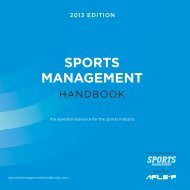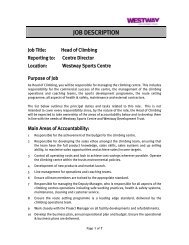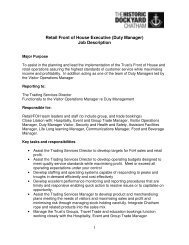sporting - Leisure Opportunities
sporting - Leisure Opportunities
sporting - Leisure Opportunities
You also want an ePaper? Increase the reach of your titles
YUMPU automatically turns print PDFs into web optimized ePapers that Google loves.
ENERGY<br />
CREDIT WHERE<br />
CREDIT’S DUE<br />
Over the next few editions we’ll be looking at<br />
energy-related issues from utility procurement to<br />
renewable products. This issue, The Energy Desk’s<br />
managing director Ian Edwards takes a look at the<br />
best way of getting credit to pay for energy use<br />
T<br />
he global financial downturn<br />
affected all aspects<br />
of business and consumer<br />
life, including the energy<br />
sector. This has been particularly<br />
noticeable in relation to the issue of<br />
energy procurement.<br />
Even an organisation with a high<br />
credit rating will wince at the prospect<br />
of a utility company’s credit check. If<br />
you haven't undergone one of these<br />
credit checks yourself, you may ask<br />
why. For most the answer will undoubtedly<br />
be the same – the depth and<br />
detail of the credit check is incomparable<br />
to any other, and a poor credit<br />
rating can pose a host of challenges<br />
when it comes to purchasing energy.<br />
Methods of energy procurement<br />
have changed significantly over the<br />
past few years. An organisation was<br />
once able to pay for the energy it<br />
used in arrears, but must now calculate<br />
projected energy consumption,<br />
sign contracts for anything from<br />
two- to five-year terms and pay hefty<br />
deposits of three to six months to the<br />
utility company up front.<br />
POTENTIAL PROBLEMS FOR<br />
YOUR BUSINESS<br />
Your credit rating determines the<br />
terms of your energy contract, including<br />
the tariff, deposit value and<br />
contract timeframe. If you're a new<br />
company, without historical accounts,<br />
you will have little or no credit rating. If<br />
you have a high credit limit of £1m but<br />
your credit score from Experian falls<br />
below 51, your potential supplier will<br />
probe into your accounts, and this has<br />
become a common problem within the<br />
leisure and retail industry. Having a<br />
low credit rating will undoubtedly result<br />
in your business being tied into a contract<br />
on a higher tariff.<br />
With the UK sport and leisure<br />
industry spending an estimated<br />
£700m every year on energy use, this<br />
can present huge challenges with the<br />
Sustainabilitylive! 22-24 May 2012 NEC Birmingham, UK<br />
At the heart of the Sustainabilitylive!<br />
event is a three day conference,<br />
which will examine the corporate<br />
sustainability agenda in detail. Key<br />
topics to be discussed include water<br />
efficiency, sustainability reporting,<br />
resource scarcity, supply chain management,<br />
employee engagement and<br />
the CRC efficiency scheme.<br />
Speakers include Peter Madden,<br />
CEO of Forum for the Future; Dax<br />
Lovegrove, head of Business &<br />
Industry, WWF; Katie Chapman,<br />
head of sustainability and reporting,<br />
Virgin Media; Eric Lounsbury,<br />
strategy manager, Carbon Trust; and<br />
Peter Bragg, general manager of<br />
Environment and Energy at Eurostar.<br />
The Environment Energy Awards,<br />
which celebrate excellence and<br />
innovation from businesses and<br />
technology providers in the market,<br />
will take place on 22 May.<br />
Details: www.sustainabilitylive.com<br />
The sport and leisure industry<br />
spends £700m per year<br />
on energy (Carbon Trust)<br />
management of cashflow.<br />
But providing energy is not without<br />
risk to the supplier. Utility companies<br />
will buy your energy up front and<br />
your credit rating is the only factor<br />
that can indicate the risk you pose to<br />
them. For example, a £500k spend<br />
on a three year contract adds up to<br />
a £1.5m energy spend that the supplier<br />
will have to purchase up front. If<br />
you have a low credit rating, you will –<br />
in the eyes of the supplier – be at risk<br />
of defaulting. Without a guarantee of<br />
payments, utility companies will risk<br />
taking on the financial burden should<br />
you not use or pay for the energy they<br />
have invested in on your behalf.<br />
What’s more, if you are unable to<br />
enter a contract with a utility company,<br />
you won't benefit from lower<br />
contract rates and your tariff could<br />
rocket to three or four times higher<br />
than the contract tariff.<br />
Consultants and purchasing consortiums<br />
are, of course, in a position<br />
to speak to your utility provider on<br />
your behalf to negotiate the terms of<br />
62<br />
Read <strong>Leisure</strong> Management online leisuremanagement.co.uk/digital ISSUE 2 2012 © cybertrek 2012
















